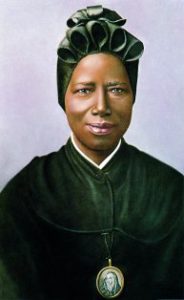February, 2022 Monthly Reflection
February 2, 2022Let Us Celebrate Courage, Resilience and Compassion
By Jeanne Christensen, RSM
 February 8 is the feast day of St. Josephine Bakhita. Why do we celebrate her? Because she is the patron saint for persons who are trafficked and exploited. Human trafficking is an insidious, violent, demeaning and exploitative tragedy. A tragedy where human persons are considered property to be bought, sold, and discarded when no longer useful or profitable. And yet, those very human persons who are trafficked are often some of the most resilient people I know.
February 8 is the feast day of St. Josephine Bakhita. Why do we celebrate her? Because she is the patron saint for persons who are trafficked and exploited. Human trafficking is an insidious, violent, demeaning and exploitative tragedy. A tragedy where human persons are considered property to be bought, sold, and discarded when no longer useful or profitable. And yet, those very human persons who are trafficked are often some of the most resilient people I know.
In 1869 as a young girl, St. Josephine Bakhita was kidnapped and sold into slavery. She was treated brutally by her captors as she was sold and resold. She did not remember her name, Bakhita, which means “fortunate one,” a name given to her by her kidnappers. “Fortunate one,” yes, because she eventually gained her freedom and spent the rest of her life working to free enslaved others and to serve them with compassion. She is described as resilient as are trafficking survivors today.
In 2004 for the first time, I met prostituted women who had survived and were transitioning successfully into recovery. I was awed by their stories but more so by their strength, courage, and resilience. How could anyone survive what they had experienced and still have hope? One told me, “God reached into hell and pulled me out.” She went on to help other victims and survivors.
Another woman’s story speaks to the trauma victims endure. The name we know her by is Daria but that is not her birth name. When Daria was twelve she ran away from home and her mother’s current abusive boyfriend. Within two days on the streets, a young and fun-loving older boy promised her a safe place to stay, food, and a chance to be a just-discovered model. Daria thought, “a dream come true.” It became a nightmare of posing for pornographic images and being sold for sex by the boy who made false promises. She was stripped of her clothing, humiliated, and exposed to harsh, unforgiving eyes.
This terrible trauma lasted for many months, until one night she was left for dead in a motel room – beaten for not “meeting expectations” and bringing a good return on the boy’s “investment.” She survived and with help from a small, local organization dedicated to helping victims of trafficking, found her way to healing and recovery. Now she is clothed, praised for her strength to rebuild her life and the eyes looking at her now express pride and encouragement.
The hope in this story? Daria was able to earn an associate’s degree in nursing and secure employment and the existence of the small, local organization that assisted her with compassion, understanding, and acceptance.
The survivors of human trafficking show us courage and hope, dare us to see clearly and to be their voice. We have no idea or experience of the horrendous treatment they survive. We are amazed by their courage, resilience and compassion for each other. In my experience, I receive more than I ever give. To fully respond to our calling for ministry with them, we must simply walk with them until we understand. “We must be willing to be disciples of compassion — learning to see with faith and deeper insight so that we are enabled to see below the surface, to see the meaning of things and events. Empathy is the ability to see yourself in another, especially someone who is suffering, and to respond to them with compassion.
What do we see below the surface? Do we see any complicity in structures or systems from which we benefit? Can we acknowledge that poverty is a modern form of slavery, that cheap labor and environmental destruction factored into our desire or demand for low consumer prices and higher profits? Can we live with knowing that comfort, convenience, and entertainment for some requires the exploitation of others?
Besides the larger patterns of oppression that become visible when we see below the surface, we may find small conversions occurring every day as we learn to see victims and survivors as no longer invisible, stereotyped, labeled, insignificant or threatening. Once they become real people, relationships are possible. Our world expands as we discover more diversity but also the common humanity we share with everyone.
Ultimately, those who can acknowledge the disparity and discrimination in our society, in the world, can also recognize the image of God everywhere and in everyone. When this happens, we are not far from the Kingdom of God.”
A portion of this reflection was adapted from a column by Pat Marrin in the National Catholic Reporter, 06/22/2020, “I Want to See” Used with permission.
Category: Monthly Reflections

